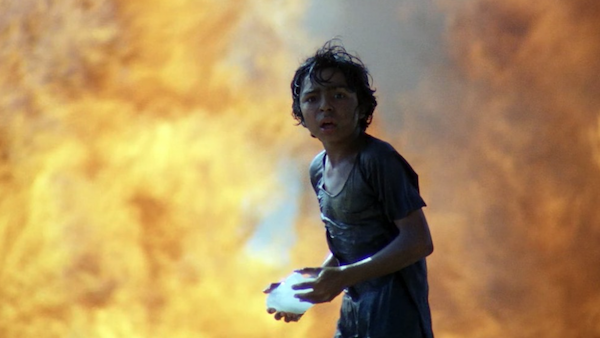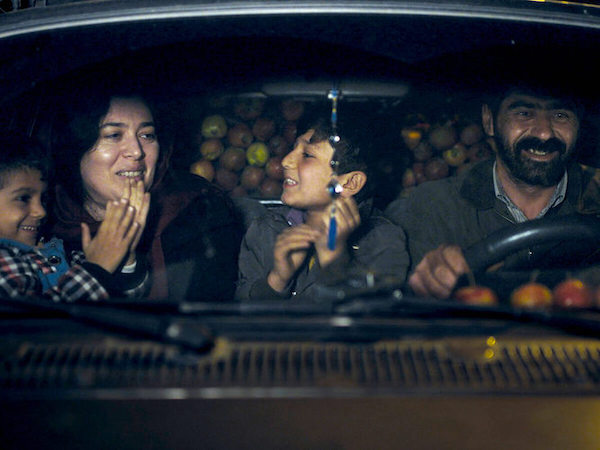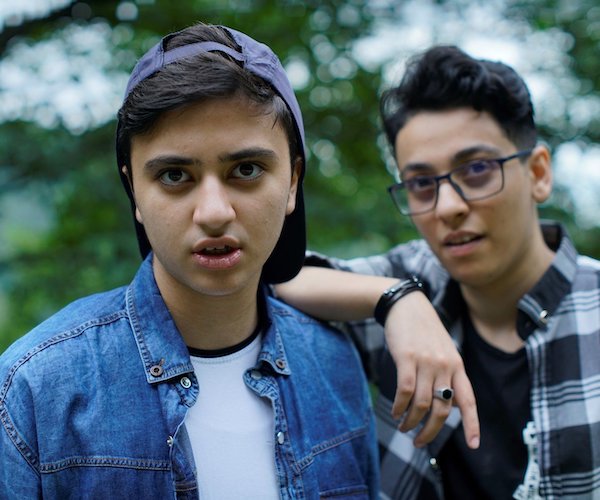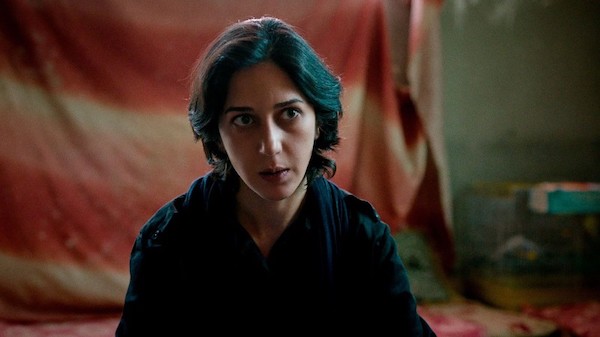The Boston Festival of Films from Iran returns to the MFA — Beneath The Veil
By Peter Keough
These films provide a glimpse into the workings of a culture and society increasingly cut off from the rest of the world as well as a taste of a cinema that had once been among the world’s greatest and which may one day be again.
After a two-year hiatus due to the pandemic The Boston Festival of Films from Iran (January 26-28 ) returns to the Museum of Fine Arts. The handful of films programmed this year don’t measure up to those in past festivals when new works by Mohsen Makhmalbaf, two-time Oscar-winner Asghar Farhadi, Jafar Panahi (the world’s most prolific, imprisoned filmmaker), and the late Abbas Kiarostami were featured. But they provide a glimpse into the workings of a culture and society increasingly cut off from the rest of the world as well as a taste of a cinema that had once been among the world’s greatest and which may one day be again.

A scene from the restoration of The Runner.
A seminal work in the Iranian New Wave, Amir Naderi’s newly-restored, autobiographical The Runner (1984; screens January 28 at 1 p.m. ) opens with a scene reminiscent of the final freeze frame of François Truffaut’s The 400 Blows (1959). Amira, an 11-year-old illiterate orphan, stares out to sea from the beach. Unlike Truffaut’s young protagonist, he’s screaming.
He sees ships heading to destinations he cannot imagine and he’s stuck on shore where he must do odd jobs and fight other boys and sometimes adults for the pittance he needs to survive. He dives for bottles tossed overboard by rich tourists, polishes shoes, and sells water, all with the uncompromising zeal with which he races with other kids or just runs maniacally by himself. Naderi’s style mirrors his namesake’s obsessiveness, focusing on elemental details such as ice, fire, waves, ships, trains, airplanes, magazines, and the alphabet with a rhythmic repetitiveness that elevates them into metaphors. Visually stunning and with an evocative soundtrack punctuated by such apt background tunes as “What the World Needs Now Is Love,” “What a Wonderful World,” and “Bennie and the Jets,” Naderi’s modest masterpiece epitomizes the Iranian genre of children’s films.

A scene from The Apple Day.
The influence of Naderi’s nearly 40-year-old film can be seen in Mahmoud Ghaffari’s The Apple Day (2022; screens January 26 at 7 p.m.). His young protagonist Saeed perseveres with the same dogged determination and sense of righteousness as does Amira. When his father’s truck is stolen, ending his livelihood of selling apples (shades of Bicycle Thieves), Saeed pitches in by doing odd jobs and resorting to some shady practices. Unlike Naderi’s orphan, though, Saeed has a family and despite some friction they stick together. Newcomers to Tehran from the pastoral poverty of the countryside, they have a hard time adjusting to the bureaucracy and corruption (the schoolteacher even takes a bribe) that stymie their efforts to survive.
Complicating Saeed’s efforts further is his younger brother’s school assignment – he is supposed to bring in a bunch of apples to share with his classmates as a kind of show-and-tell for his father’s erstwhile occupation. Driven by the kind of pride motivating Amira in The Runner, Saeed goes to great lengths, like stealing apples from a cemetery, to fulfill this obligation though it is no longer applicable. But most of his schemes are thwarted with exasperating irony.
Like Naderi, Ghaffari relates this simple, parable-like story with details, landscapes, and architecture that are visually striking and limpidly metaphorical. The hills of the countryside dotted with sheep contrast with the towering, starkly white, unfinished apartment blocks of Teheran, vertical equivalents of the monolithic ocean liners in The Runner.

A scene from This Is Not Me.
In September 2022 Iran’s morality police arrested Jina “Mahsa” Amini because she was “improperly” wearing her hijab – the head covering required by law. She died three days later while still in custody and protests against this outrage grew into a movement that still is going strong and threatens to undermine the Iranian theocracy. Amini’s fate comes inevitably to mind at the beginning of Saeed Gholipour’s This Is Not Me (2022; screens January 28 at 3 p.m.) when a person in a hijab declares, “Whatever happens in court today.. you won’t see me dressed in this costume again.”
The speaker is Saman, a 27-year-old transgender man, and the occasion predates the death of Amini but the injustice is similar — if not more insidious. Though Iran is the only Muslim country in the Persian Gulf that allows trans people to have their true gender recognized by law (all other LGBQ+ identity is criminalized), and though Saman’s parents are supportive and he has access to medical and legal assistance, the bureaucratic and judicial red-tape and Catch-22 absurdities have prolonged his transition into a Sisyphean ordeal. Among other galling complications he will have to identify as a woman and abide by all limitations imposed on women by sharia law – including wearing a hijab — until he has gender-affirming surgery. In the film Gholipour also follows Shervin, a 16-year-old transgender male, as the two maneuver through the legal and social labyrinth, often frustrated and sometimes near despair, in a struggle to attain the basic right to be themselves.

Zar Amir Ebrahim in a scene from Holy Spider.
The hijab also plays a key role in Iranian-Danish filmmaker Ali Abbasi’s Holy Spider (2022; screens January 27 at 7 p.m.) – the serial killer of the title uses it to strangle his victims. The film is based on the true story of Saeed Hanaei , who from 2000 to 2001 murdered 16 women, mostly drug addicts and prostitutes, in the pilgrimage city of Mashhad. He believed he was cleansing the community of sinners, and many sympathized with this goal, overtly or covertly, including some in local law enforcement and in the clergy (Abbasi shows them wearing the same ring as the killer).
A female journalist from Tehran (played by Zar Amir Ebrahimi in a performance that won her the Best Actress award at Cannes) arrives to investigate and finds the police are stonewalling while the body count rises. So she offers herself as bait to the killer, posing as a prostitute. Though not as startling in its twists or as intricate in its exploration of gender and sexuality as Abbasi’s 2018 film Border, Holy Spider works well as an exercise in suspense and horror. More importantly it exposes the layers of hypocrisy and corruption in a failed system and the sexual pathology of pious, murderous misogyny.
Peter Keough writes about film and other topics and has contributed to numerous publications. He had been the film editor of the Boston Phoenix from 1989 to its demise in 2013 and has edited three books on film, most recently For Kids of All Ages: The National Society of Film Critics on Children’s Movies (Rowman & Littlefield, 2019).
